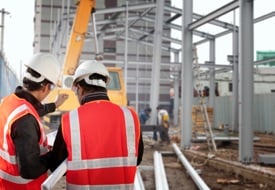
Builder’s risk cover is a type of contractor insurance that applies during construction. It’s essential for builders wanting to avoid on-site losses.
However, it can be confusing. Therefore, this post explores what builder’s risk insurance covers, how lenders package it, and the exclusions/limitations you can expect when taking out a policy.
What it covers
Builder’s risk insurance covers various losses and damages that can occur on construction sites during projects. However, policies can vary significantly. Some are comprehensive (meaning they cover nearly all losses), while others are more specific.
Items builder’s risk insurance can cover include:
- Theft
- Property damage
- Arson
- Damage to materials in transit to the building site
- Removal of debris
- Backed-up sewers and drainage systems
- Damage by hail or wind
- Collapse risk
However, don’t take this list as gospel. Always check the policy wording to see if the insurer includes all the coverage you want. Sometimes, you can ask them for additional coverage in exchange for higher premiums.
Project-specific coverage
Some builder’s risk insurance policies provide blanket protection throughout the year. These are helpful for contractors involved in numerous residential and commercial projects (i.e. 25 or more annually), reducing paperwork and streamlining applications.
However, you can get a “single policy” for new construction and remodeling projects. These are helpful when you want builder’s risk insurance as a one-off and only want to cover a single site.
Builder’s risk insurers will cover several project types, depending on your requirements. However, you must provide them with this information upfront.
Most contractors opt for builder’s risk insurance to cover new constructions. These can include home and apartment developments, condo buildings, and duplexes. It is also available on commercial projects.
Another type, remodeling builder’s risk insurance, applies when changing a building’s function or structure. For example, you could get insurance if you add a mezzanine level to a living area or extend a building.
Lastly, you can sometimes get installation-related builder’s risk insurance. Unlike a complete remodel, this covers single fixtures and fittings, like cabinets or awnings.
Exclusions and limitations
Unfortunately, builder’s risk insurance won’t protect you against everything. As such, you may need to add other insurance products to your stack.
Like most insurance offerings, builder’s risk insurance doesn’t protect against force majeure. It won’t pay out for acts of war, terrorism, or other government actions (like property confiscation).
It also doesn’t cover contractor or employee injuries – one of the most common building site claims. For this, you will need workers' compensation and public liability insurance.
Other exclusions can include:
- Extreme geological events, like earthquakes
- Intentional acts of destruction
- Damage due to preventable design flaws or plans
- Vehicle damage
- Depreciation
Contact Us Today to Save on Builder's Risk Insurance!
Still confused? Contact American Insuring Group for the best rates on builder’s risk insurance. As independent brokers, we shop the market to find you the best deal on quality insurance! So call us today at (610) 775-3848 or click here to start saving.



 If you get hired as a subcontractor, don’t assume that the general contractor’s Contractors Insurance covers you. As a subcontractor, you are NOT considered an employee of that contractor, and
If you get hired as a subcontractor, don’t assume that the general contractor’s Contractors Insurance covers you. As a subcontractor, you are NOT considered an employee of that contractor, and  Insurance is a way to protect the things you have of value – vehicles, employees, buildings, etc. But what if you’re in the process of building or remodeling a structure? Does it have any value? Of course, it does, and it is susceptible to damage just like anything else, which is where Builder’s Risk Insurance comes into play.
Insurance is a way to protect the things you have of value – vehicles, employees, buildings, etc. But what if you’re in the process of building or remodeling a structure? Does it have any value? Of course, it does, and it is susceptible to damage just like anything else, which is where Builder’s Risk Insurance comes into play.  Risk management is part of any successful business, and it is especially true in an industry fraught with as many dangers as construction. Accidents that cause injury, damage, or death occur on worksites across the country every day.
Risk management is part of any successful business, and it is especially true in an industry fraught with as many dangers as construction. Accidents that cause injury, damage, or death occur on worksites across the country every day. Accidents happen, but the right insurance will help protect your business. For more information about contractor insurance and any time of business insurance you may need, contact American Insuring Group at
Accidents happen, but the right insurance will help protect your business. For more information about contractor insurance and any time of business insurance you may need, contact American Insuring Group at  Having a freshly constructed building for your business is exciting. It’s the culmination of an undertaking that involved the acquisition of land, working with an architect, hiring a construction company, and picking out the furnishings. After you have completed the project, you will have added a significant investment that you will undoubtedly protect with a well-designed insurance program.
Having a freshly constructed building for your business is exciting. It’s the culmination of an undertaking that involved the acquisition of land, working with an architect, hiring a construction company, and picking out the furnishings. After you have completed the project, you will have added a significant investment that you will undoubtedly protect with a well-designed insurance program. We can help you create a policy that meets the needs of your construction project. As independent insurance agents, we're free to shop among competing providers to help you obtain the best insurance solution at the right price.
We can help you create a policy that meets the needs of your construction project. As independent insurance agents, we're free to shop among competing providers to help you obtain the best insurance solution at the right price. Whether you’re a subcontractor or a general contractor – whether you build small backyard sheds or giant commercial buildings – whether you’re a one-man remodeling business or a multi-million dollar construction company, there are three types of insurance you need to consider. In other words, the size of your business and the size of the project make little difference. If you want to protect your investment, your employees, and even your business, there are three types of
Whether you’re a subcontractor or a general contractor – whether you build small backyard sheds or giant commercial buildings – whether you’re a one-man remodeling business or a multi-million dollar construction company, there are three types of insurance you need to consider. In other words, the size of your business and the size of the project make little difference. If you want to protect your investment, your employees, and even your business, there are three types of  For more customized information about your construction insurance or
For more customized information about your construction insurance or  Thirty-nine percent of households have dogs, so it’s no surprise that more companies – including Google, Etsy, and Build-A-Bear Workshop – are allowing employees to bring their dogs to work. After all, Congress has been dog friendly since the 19th century. And, according to a survey conducted by the American Pet Products Manufacturers, 17 percent of Americans work at pet-friendly companies. What are the benefits? What are the risks? Does your business insurance adequately cover the risks? You should know the answers to these questions before implementing a pet-friently workplace policy.
Thirty-nine percent of households have dogs, so it’s no surprise that more companies – including Google, Etsy, and Build-A-Bear Workshop – are allowing employees to bring their dogs to work. After all, Congress has been dog friendly since the 19th century. And, according to a survey conducted by the American Pet Products Manufacturers, 17 percent of Americans work at pet-friendly companies. What are the benefits? What are the risks? Does your business insurance adequately cover the risks? You should know the answers to these questions before implementing a pet-friently workplace policy. Contact Us for the Right Business Insurance Protection to Support a Pet-Friendly Workplace
Contact Us for the Right Business Insurance Protection to Support a Pet-Friendly Workplace Builder’s Risk Insurance (a.k.a. Course of Construction Coverage) is property insurance that covers damage to a building during construction. It may cover just the structure itself, or it can include materials, fixtures, and/or equipment being used in the construction or renovation of the building.
Builder’s Risk Insurance (a.k.a. Course of Construction Coverage) is property insurance that covers damage to a building during construction. It may cover just the structure itself, or it can include materials, fixtures, and/or equipment being used in the construction or renovation of the building.  Whether you need general contracting insurance, contractor workers’ comp, builder’s risk insurance, or any other type of insurance, we have you covered. We’ll take a close look at your business; recommend the right insurance for you, then (after shopping many competing insurance brands) offer you the best insurance protection at the best price.
Whether you need general contracting insurance, contractor workers’ comp, builder’s risk insurance, or any other type of insurance, we have you covered. We’ll take a close look at your business; recommend the right insurance for you, then (after shopping many competing insurance brands) offer you the best insurance protection at the best price.



